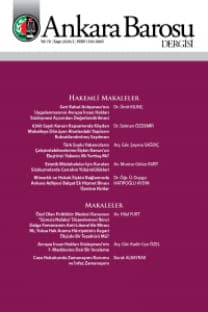Yeni Düzenlemeler Çerçevesinde Doçentlik Sınavı
2547 sayılı Kanun’un 24’üncü maddesinde düzenlenen ve Üniversitelerarası Kurul Genel Sekreterliği tarafından yürütülen Doçentlik Sınavı, zincir işlem şeklinde birbirini takip eden bir takım süreçlerden oluşmaktadır. Bu birbirini takip eden süreç incelendiğinde; Doçentlik sınavına müracaat edilmesi ile baş- layıp Doçentlik unvanının verilmesine değin devam eden pek çok idari işlem ÜAK Genel Sekreterliği tarafından yürütülmekte ve bu birbirini takip (zincir niteliğindeki) eden ayrılabilir işlemler, kişiler hakkında icrai nitelikte sonuç doğuran işlemler olarak idari yargı denetimine tabi bulunmaktadır. Doçentlik sınavı ile ilgili olarak 07.02.2015 tarihinde 29260 sayılı Resmi Gazetede yayımlanan Doçentlik Sınav Yönetmeliği yürürlüğe girmiş olup ancak Yönetmeliğin Geçici 1. maddesindeki geçiş hükmü gereği yeni yürürlüğe giren Yönetmelikle birlikte, yönetmeliğin yürürlüğe girmesinden önce sınava başvuranlarla ilgili olarak bir önceki; yani 31.01.2009 tarih ve 27127 sayılı Resmi Gazetede yayımlanan yönetmeliğin uygulanacağı hususu da düzenleme altına alınmıştır. Bu düzenleme yanında 2015 yılı içerisinde iki önemli gelişme yaşanmış ve Danıştay 8. Dairesi tarafından Yönetmeliğin pek çok maddesinin yürütülmesi durdurulmuştur. Ayrıca 31.12.2015 tarihinde Üniversitelerarası Kurul Başkanlığı resmi internet sitesinde yayımlanan ilanla doçentlik kriterleri büyük oranda değiştirilerek bu değişikliklerin de 2016 yılı Ekim döneminden itibaren yürürlüğe gireceği duyurulmuştur. Bu makalede gerek yeni yürürlüğe giren Yönetmelik hükmü, gerek uygulamaya konulacak olunan doçentlik kriterleri ve gerekse halihazırda uygulaması devam eden 2009 tarihli Yönetmelik hükmünden kaynaklanan temel sınav aşamaları ile bu aşamalarda yaşanan temel hukuki sorunlar; ÜAK uygulamaları, emsal yargı kararları ve idare hukuku ilkeleri çerçevesinde tartışılmaktadır
Anahtar Kelimeler:
Doçentlik Sınavı, Puanlama Sistemi, Takdir Yetkisi, Baş- vuru Koşulları, Unvan.
THE ASSISTANT PROFESSORSHIP EXAM ACCORDING TO NEW REGULATIONS
The Assistant Professorship examination which is regulated by Law No. 2547 and conducted by the General Secretariat of the Interuniversity Committee comprises a chain of procedures that follow one another. When these successive procedures are examined, it can be seen that from applying for the assistant professorship examination to granting of the title of assistant professorship, most of the administrative stages of the process are carried out by the General Secretariat of the Interuniversity Committee, and that these successive (chain-like), but separable procedures are considered as part of administrative acts that are subject to judicial review that may yield executive consequences for individuals. Regarding the assistant professorship examination, a Regulation on the Exam of Assistant Professorship has been published in the Official Gazette No. 29260 and came into force on 7 February 2015. This new Regulation, however, states that -as required by the transition provision stated in Temporary Article 1 of the Regulation-, for those who had applied for the examination before the date the new Regulation came into force, the provisions of the previous Regulation –which had had been published in the Official Gazette No. 27127 on 31 January 2009- will be applied together with the provisions of the new Regulation. Apart from this Regulation, two other important developments had occurred in 2015, and execution of many articles of the Regulation has been suspended by the 8th Department of the Council of State. Moreover, on 31 December 2015, with an announcement published on the official web site of the Presidency of the Interuniversity Committee, the criteria for assistant professorship have mostly changed, and it was declared that these changes will come into force from October 2016. In this article, within the framework of precedent judicial decisions and principles of administrative law, we are going to examine and discuss the abovementioned provision of the Regulation that has been newly put into effect; criteria for assistant professorship that will be in force at the end of this year; fundamental legal problems that may arise from applying the above mentioned provision of the previous Regulation (2009) (which is currently still valid), to the stages of the examination; and practices of the Interuniversity Committee
Keywords:
The Exam of Assistant Professorship, Scoring System, Power of Discretion, Terms of Application, Title.,
- ISSN: 1300-9885
- Yayın Aralığı: Yılda 4 Sayı
- Başlangıç: 1942
- Yayıncı: Ankara Barosu Başkanlığı
Sayıdaki Diğer Makaleler
ERDOĞAN’IN “OTOLİMİTASYON DEKLARASYONU”, OHAL VE AKADEMİK ÖZGÜRLÜK
İcra Dairelerinin Etkinliğinin Arttırılması Model Uygulaması Üzerine
Gülcan ZİYTAK, Av. Cemalettin GÜRLER
Uluslararası Hukuk Açısından Çocuk Askerler ve PKK’nın Çocuk Askerleri/Militanları
Yrd. Doç. Dr. Serkan KEKEVİ, Yrd. Doç. Dr. Gökmen KILIÇOĞLU
Anayasalarımızda Yargının Bağımsızlığı ve Tarafsızlığı
Yeni Düzenlemeler Çerçevesinde Doçentlik Sınavı
İdare’nin Yargısal Mercilerde Temsili ve Temsilcilerin Sorumluluğu
